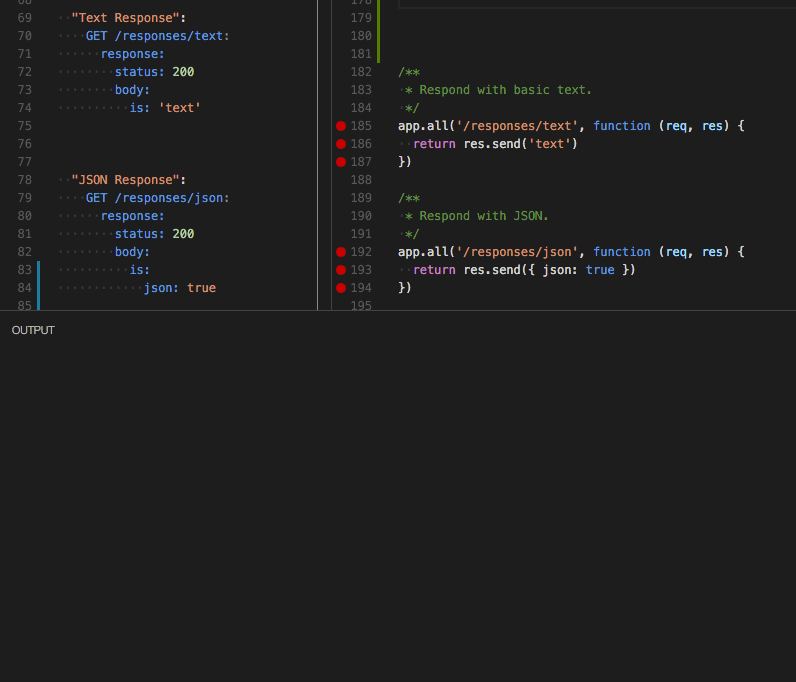Http Blackbox API Tester (http-bat)
Describe your platform independient API tests using ATL (Api Testing Language) and run them using http-bat. It also generates coverage reports for your RAML files.
Usage
Install
Install the tool executing npm install -g http-bat
Using command line, useful for CI
Run your tests on api folder:
$ http-bat api/*.spec.yml
Run your tests with a custom remote URI:
$ http-bat github_api/*.spec.yml --uri http://api.github.com
You need it embeded on a Node project? (Useful for coverage and CI)
Install the package
$ npm install http-bat --save-dev
test/api.spec.js<- mocha spec
require'http-bat/dist/adapters/mocha' // Mocha detection should be automatic. But since mocha and node changes a lot, this line may be required. GenericAdapter.runFile'file.yaml'Execute mocha on your project
$ mocha

Current features
You can read the entire list on this page
VSCode extension
Examples
Wiki examples
- Full CRUD
- Obtain and use access tokens
- Travis CI for APIs
- Travis CI for APIs (With RAML coverage)
- Using environment variables, e.g. storing credentials.
Test response status code
#%ATL 1.0 tests: "Favicon must exists": GET /favicon.ico: response: status: 200 "Should return 401": GET /unauthorized_url: response: status: 401 "Should return 404": GET /asjdnasjdnkasf: response: status: 404Send query string parameters
#%ATL 1.0 tests: "Inline query string": GET /orders?page=10: response: status: 200 "Non inline": GET /orders: queryParameters: page: 10 response: status: 200 "Override inline query string": # The final url will be /orders?page=10&qty=20 GET /orders?page={----asd---}&qty=20: queryParameters: page: 10 response: status: 200Validate response ´Content-Type´
#%ATL 1.0 tests: "Must return text": GET /responses/text: response: content-type: text/plain "Must return json": GET /responses/json: response: content-type: application/json "Must return url-encoded": GET /responses/url-encoded: response: content-type: application/x-www-form-urlencodedSend headers
#%ATL 1.0 tests: "Headers": GET /profile#UNAUTHORIZED: response: status: 401 GET /profile: headers: Authorization: Bearer asfgsgh-fasdddss response: status: 200 Validate response headers
#%ATL 1.0 tests: "Headers": PUT /bounce/headers: response: headers: Access-Control-Allow-Headers: "Authorization, X-Default-Header, X-Custom-Header" # literal value Validate response content
#%ATL 1.0 tests: "Must validate response body": GET /text: response: body: content-type: text/plain is: "Success" # "is" means equals. In this case the response is the text "Success" GET /json: response: body: content-type: application/json is: !!map { json: true } # "is" means equals. In this case the response is the JSON {"json":true} GET /json/v1: response: body: content-type: application/json is: json: true # "is" means equals. In this case the response is the JSON {"json":true} # this is the same as the previous example Validate response (partially)
#%ATL 1.0 tests: "Must validate response body": GET /json: response: body: content-type: application/json # In this case the response is the JSON { "json":true, "a": 1, "b": 2 } matches: - a: 1 # "json" and "b" properties will be ignored GET /users: response: body: content-type: application/json # In this case the response is the JSON # [ # { "id": 1, "name": "Agu" }, # { "id": 2, "name": "Dan" } # ] matches: - "[0].id": 1 - "[1].name": DanExecute in sequence. Obtain access token
#%ATL 1.0 variables: # anything can be stored here oauth: accessToken: "INVALID_TOKEN" tests: "Access control by token, executed in sequence": GET /secured_by_token#should-be-unauthorized: description: Must be unauthorized queryParameters: accessToken: !!variable oauth.accessToken response: status: 401 POST /get_access_token: # the server responds { new_token: "asd" } description: Obtain access token response: body: take: # take "new_token" from response body - new_token: !!variable oauth.accessToken GET /secured_by_token: description: Now the status must be 200 OK queryParameters: # use the access token obtained previously accessToken: !!variable oauth.accessToken response: status: 200 body: is: success: trueCRUD
This example shows how to create an asset, check that it exists, put new content on it and delete it. Then check 404 for the same asset.
Also shows how use ENVIRONMENTS variables. ENV variables are stored on variables.ENV, can be accessed using!!variable ENV.*
#%ATL 1.0 variables: ENV: csToken: Bearer <<YOU MUST DEFINE YOUR csToken ON ENV>> organizationId: abc123 flow: id: "" tests: "Project create and delete": POST /organizations/{orgId}/projects#create'first: description: Create project uriParameters: orgId: !!variable ENV.organizationId headers: Authorization: !!variable ENV.csToken request: json: name: RetrieveEmployeeFlow, created: 06-06-06 updated: 06-06-06 environmentId: asd1f65dasf656 organizationId: !!variable ENV.organizationId response: status: 201 body: # store the whole response (project) in projectNuevo take: !!variable projectNuevo GET /organizations/{orgId}/projects/{projectId}: description: Check that the created project exists uriParameters: orgId: !!variable ENV.organizationId projectId: !!variable projectNuevo.id headers: Authorization: !!variable ENV.csToken response: status: 200 body: matches: - id: !!variable projectNuevo.id PUT /organizations/{orgId}/projects/{projectId}: uriParameters: orgId: !!variable ENV.organizationId projectId: !!variable projectNuevo.id headers: Authorization: !!variable ENV.csToken request: json: !!variable projectNuevo response: status: 200 body: matches: id: !!variable projectNuevo.id DELETE /organizations/{orgId}/projects/{projectId}: uriParameters: orgId: !!variable ENV.organizationId projectId: !!variable projectNuevo.id headers: Authorization: !!variable ENV.csToken response: status: 200 GET /organizations/{orgId}/projects/{projectId}#mustn't exists: uriParameters: orgId: !!variable ENV.organizationId projectId: !!variable projectNuevo.id headers: Authorization: !!variable ENV.csToken response: status: 404 


